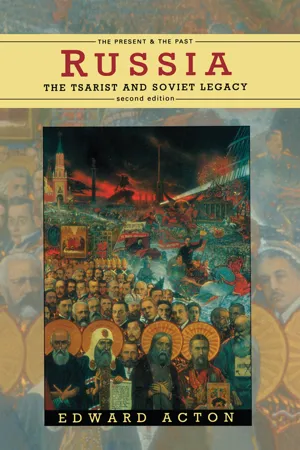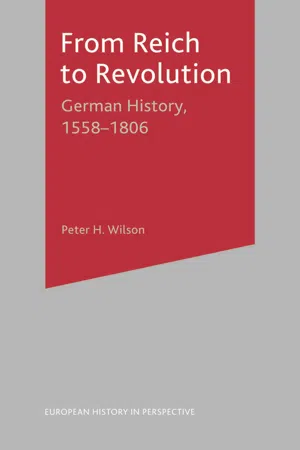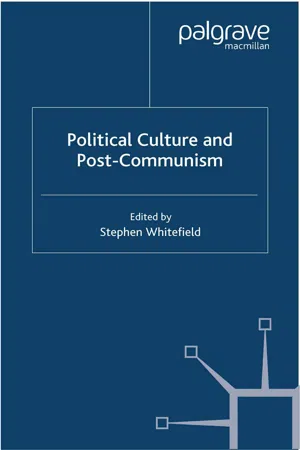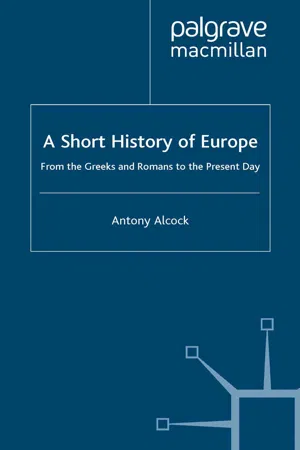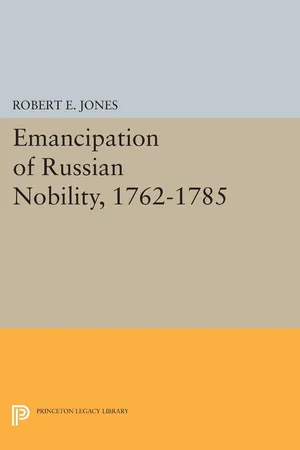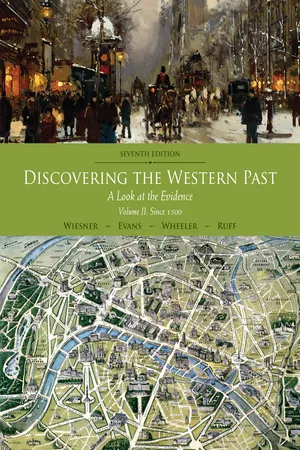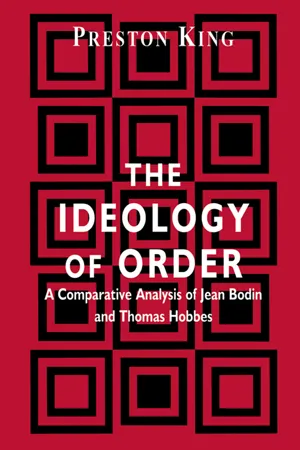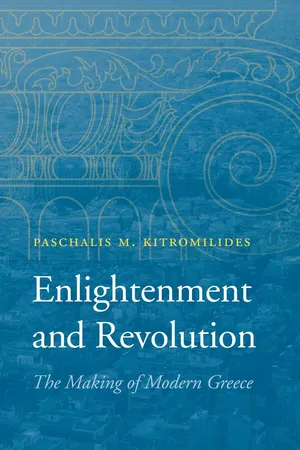History
Absolutism in Russia
Absolutism in Russia refers to the period of centralized power under the rule of the Tsars, particularly during the reign of Peter the Great and his successors. This form of government was characterized by the monarch's absolute authority over all aspects of society, including politics, the economy, and culture. It led to significant modernization and expansion of Russia, but also resulted in the suppression of individual freedoms and the imposition of strict social hierarchy.
Written by Perlego with AI-assistance
Related key terms
1 of 5
8 Key excerpts on "Absolutism in Russia"
- eBook - ePub
Russia
The Tsarist and Soviet Legacy
- Edward Acton(Author)
- 2014(Publication Date)
- Routledge(Publisher)
Chapter 2........................................................................... The genesis of Russian ‘absolutism’ Numerous labels have been attached to the political system which Ivan the Great bequeathed to Muscovy at the beginning of the sixteenth century – oriental despotism (Plekhanov, Szamuely), patrimonial monarchy (Pipes), estate-representative monarchy (favoured by Soviet historians). In part this variety reflects the poorly defined vocabulary available to historians seeking to distinguish various traditional authoritarian regimes. But it also derives from sharply differing interpretations of the nature of the Muscovite system. The central issue at stake is simple and crucial to an understanding of Russian history. How far was the State – the power concentrated in the hands of the Grand Prince – representative of and responsive to privileged groups or interests within society? Was the ruler’s freedom of action signifi-cantly limited by independent institutions and social pressure or was he in a position to subject every social stratum to his own will? In a famous description of Basil III, the Imperial Ambassador Sigismund von Herberstein described him as the most despotic sovereign on earth. ‘He has power over both secular and clerical individuals and freely, according to his will, disposes of the life and property of all. Among the counsellors whom he has, none enjoys such importance that he would dare to contradict him in anything or be of another opinion.’ 1 Unification under Moscow had been accompanied by the creation of a powerful centralized monarchy. All appointments to military and administrative posts were in the gift of the Grand Prince. It was in his name that taxes were collected, the law enforced, war waged and treaties signed. His realm was bound together by an increasingly standardized legal code, gradually extended over newly incorporated areas, a rudimentary postal system, and uniform coinage, weights, and measures - eBook - PDF
From Reich to Revolution
German History, 1558-1806
- Peter H. Wilson(Author)
- 2019(Publication Date)
- Red Globe Press(Publisher)
Cen-tral European and Russian development is thought to have followed the latter course, because the ‘stunted’ economic development of these regions limited the crown’s range of domestic allies. In return for con-¢rming the aristocracy’s socio-economic pre-eminence, the crown gained a free hand over ¢scal and military policy. Nobles were recon-ciled to their loss of political in£uence through alternative careers in 213 TERRITORIAL ABSOLUTISM the army, and bureaucracy that also served to keep serfs and others in their place. Absolute monarchy is thus a ‘captured state’, controlled by, or at least governing in the interests of, the aristocracy, in contrast to more liberal or conservative perspectives that see the crown as neutral, or even benign. Regardless of their ideological character, these interpretations reduce ordinary people to passive objects acted on from above, either protected and promoted by benevolent rulers, or exploited and repressed by rapacious lords. The broader population can either submit or protest, the latter action largely being dismissed as futile until the development of ‘class consciousness’ and a clear leadership with a revolutionary ideology. Recently, historians have begun to rescue ordinary people from this huge condescension of posterity, and interpret political development as the result of a wider bargaining process between rulers and wider social groups. 12 Revolts and other protests were integral to political development, compelling those in power to take account of broader opinion. Political alliances did not split along class lines, since the economic, religious and other changes of the later sixteenth century lacked a uniform social impact. This can be illustrated by brie£y analysing abso-lutism’s emergence in the Habsburg monarchy, the Hohenzollern lands and Bavaria. - eBook - PDF
- S. Whitefield(Author)
- 2005(Publication Date)
- Palgrave Macmillan(Publisher)
2 Myths about Russian Political Culture and the Study of Russian History Alexander Lukin and Pavel Lukin A belief in the dominance of authoritarianism in Russian history is widely held by political scientists. Scholarly proponents of this view – Zbigniew Brzezinski, Thomas Remington, Stephen White, Archie Brown and others – share the opinion that ‘there is no getting away from the predominantly authoritarian nature of Soviet and Russian political experience’ (Brown, 1989, p. 18; see also White, 1979, p. 22; Barghoorn and Remington, 1986, p. 5; Brzezinski, 1976, pp. 69–70) which, in their view, to a great extent determined or at least significantly influenced the country’s development in the Soviet and post-Soviet periods, impeding the emergence of the Western-style institutions. Brzezinski formulated this proposition in a concentrated form: The central and significant reality of Russian politics has been its predominantly autocratic character. Unlike its western European neighbours, Russia had not experienced a prolonged feudal phase. The overthrow of the Tartar yoke gave rise to an increasingly assertive and dominant autocracy. Property and people were the possessions of the state, personalised by the Autocrat (designed as such explicitly and proudly). The obligation of well-nigh complete subordination of any individual to the personalised symbol of the state was expressly asserted. Control over society – including the church by the state – among other means, through a census mechanism adopted centuries ahead of any corresponding European device, was reminiscent of Oriental despotisms and, in fact, was derived directly from that his- torical experience. The result has been to establish a relationship of state supremacy over society, of politics over social affairs, of the 15 functionary over the citizen (or subject), to a degree not matched in Europe; and differences of degree do become differences of kind. - eBook - PDF
A Short History of Europe
From the Greeks and Romans to the Present Day
- A. Alcock(Author)
- 2002(Publication Date)
- Palgrave Macmillan(Publisher)
But the election came after Russia had suffered a disastrous thirty-year `Time of Troubles' following the disintegra- tion of the regime after the death of Ivan the Terrible. Russia suffered internal strife, famine, and Polish invasion. Moscow was burnt and the country became practically a Polish province. What held Russia together was the Orthodox Church. It was the son of its Patriarch who was elected Tsar, but the memory of the past would ensure that future government would be strong and that the auto- cratic prerogatives of its ruler would be maintained. Thereafter, it would be difficult to change. In one other way unique to Russia was that country affected. There was much resentment at foreign influence. It was in 155 Continental Absolutism Peter's reign that was seen for the first time the mixture of fascina- tion of Russians for westerners and their superior knowledge, coupled with fear of how this knowledge could be used militarily or to undermine traditional Russian spiritual values, that has lasted until today. Prussia and Russia were successful in the seventeenth and eight- eenth centuries. With a few exceptions their leaders were efficient. They knew what they wanted, and why. They controlled the machinery of government and crushed internal opposition. They were ready to appreciate and learn from technical advances, to promote people in terms of merit, and they possessed the energy to mobilise resources available to a maximum. Their ethos, as leaders, was that they were the first servants of their state. In contrast, Turkish despotism in the seventeenth and eighteenth centuries was inefficient, and the Ottoman Empire would go into irreversible decline in the absence of able and energetic leaders. One problem was that no Turkish Sultan would consider himself a servant ± the state belonged to him as a toy. - Robert E. Jones(Author)
- 2015(Publication Date)
- Princeton University Press(Publisher)
Bureaucratic Absolutism 1762-1774 THE THREAT TO THE NOBILITY W HILE the controversy over the future role of the dvorianstvo awaited its resolution, the ad- ministrative reforms that threatened to erode the privileged standing of the dvorianstvo continued their advance. The professionalization of the state serv- ice and the expansion of the imperial bureaucracy in- creased the autonomy and capability of the state and lessened its dependence on the owners of hereditary es- tates. It was that development, more than any other, that gave rise to questions about the future status of the nobility, for ultimately that status was based upon the nobility's value to the state, on the state's inability to carry out its operations without the help of the dvorianstvo. At the root of all the questions about the nobility lay the still more fundamental question of how Russia was to be governed—whether through a hierarchy of semi- independent classes and institutions, or through a direct extension of the autocratic state. Under the first system, the authorities intermediate between the sovereign and the people are chosen not by the sovereign but by some other means such as election or heredity; the subordina- tion of those intermediate authorities to the central au- thority is limited; and government is traditional and per- sonal rather than formal and institutional. Under the second system, the intermediate authorities are agents Bureaucratic Absolutism 1762-1774 of the state selected by the central authority according to its own criteria, usually loyalty, obedience, or ability; authority is linear, with each authority obedient directly to the next highest authority and ultimately, through a chain of command, to the sovereign; and government is conducted according to formal rules and procedures prescribed from above and imposed throughout the en- tire system.- eBook - PDF
Discovering the Western Past
A Look at the Evidence, Volume II: Since 1500
- Merry E. Wiesner-Hanks, Andrew Evans, William Bruce Wheeler, Julius Ruff(Authors)
- 2014(Publication Date)
- Cengage Learning EMEA(Publisher)
[49] CHAPTER THREE STAGING ABSOLUTISM THE PROBLEM The “Age of Absolutism” is the label historians often apply to the history of Europe in the seventeenth and eigh-teenth centuries. In many ways it is an appropriate description because, with the exception of the Dutch Re-public and England (where the Civil War of 1642–1648 and the Glorious Revolution of 1688 severely limited royal power), most major European states in this era had monarchs who aspired to absolute authority in their realms. The royal absolutism that evolved in seventeenth-century Europe rep-resents an important step in govern-mental development. In constructing absolutist states, monarchs and their ministers both created new organs of administration and built on existing institutions of government to sup-plant the regional authorities of the medieval state with more central-ized state power. In principle, this centralized authority was subject to the absolute authority of the mon-arch; in practice, royal authority was nowhere as encompassing as that of a modern dictator. Poor communica-tion systems, the persistence of tradi-tional privileges that exempted whole regions or social groups from full royal authority, and other factors all set limits on royal power. Neverthe-less, monarchs of the era strove for the ideal of absolute royal power, and France was the model in their work of state building. French monarchs of the seven-teenth and early eighteenth centuries more fully developed the system of absolute monarchy. In these rulers’ efforts to overcome impediments to royal authority, we can learn much about the creation of absolutism in Europe. Rulers in Prussia, Austria, Russia, and many smaller states sought not only the real power of the French kings, but also the elaborate court ceremony and dazzling palaces that symbolized that power. Absolutism in France was the work of Henry IV (r. 1589–1610), Copyright 201 Cengage Learning. - eBook - ePub
The Ideology of Order
A Comparative Analysis of Jean Bodin and Thomas Hobbes
- Preston King(Author)
- 2013(Publication Date)
- Routledge(Publisher)
a), is just beginning to be written. The author’s apparent concern seems most fully contained in the last alternative (the notion that the violation of civil liberties increases in direct proportion to the increasing concentration of governmental power). The overall tenor of the book suggests that absolutism is some form of error or evil (with which, on one level, one may agree); and since the substantive content of absolutism is identified as centralisation, then this, too, is identified as some form of error or evil (a conclusion which is obviously silly). For the rest, the historical and argumentative leftovers of an author who advances the sort of position indicated can easily be anticipated, consisting of little more than faint and tattered photocopies of Tocqueville: the seventeenth century will be regarded as perfecting centralised ‘governmental techniques’; these will be said to be ‘appropriated by the successors of the absolutist regimes that created them’; the pre-revolutionary French monarchy will be said to have ‘paved the way’ for ‘Revolutionary and Napoleonic France’ by ‘its levelling and destroying tendencies’; whence we advance to the conclusion that the Age of Absolutism ‘comes to an end only to give way to the new age of “Democratic Absolutism”’; this being understood to mean, as already indicated, that ‘the history of absolutism is only just beginning to be written’ (pp. 18–19 and 180). Thus it is plain that Beloff identifies the history of absolutism with the growth of centralisation, and that absolutism becomes basically synonymous with centralism.Absolutism, however, is not to be equated with the centralisation of power. The term refers not so much to the fact of centralisation as to a universal justification for limitless movement towards centralisation. If we contrast absolutism, as a form of political organisation, with pluralism, we can grasp this point more clearly. To begin, absolutism cannot be equated with concentrated power; if that were so, then pluralism would prove a form of absolutism. This follows for the reason that absolutism implies a single and self-subsistent centre of power, while pluralism implies a multiplicity of such centres of power; but although absolutism implies one, and pluralism several, concentrations of power, both involve some sort of concentrated power. In so far as pluralism involves concentrated power, and in so far as absolutism is equated with concentrated (or centralised) power, then it must be concluded that pluralism is an absolutism – and this is a highly unsatisfactory conclusion to have to draw. Accordingly, we must avoid identifying absolutism with centralisation. It involves centralisation, in the way that farming involves land, but the two are not identical. - eBook - PDF
Enlightenment and Revolution
The Making of Modern Greece
- Paschalis M. Kitromilides(Author)
- 2013(Publication Date)
- Harvard University Press(Publisher)
11 If “enlightened absolutism” was meaningless as a political theory and devoid of substantial content as political practice, it represented the elo-quent expression of a political psychology pregnant with expectations. The emergence of this political psychology, and its focus on absolutism’s 120 E N LI G HTE N M E NT A N D R E VO LU TI O N promise of change, was a powerful indication of the evolution of political consciousness in that age of Enlightenment. The static paternalism of tradi-tional kingship had been replaced by the expectation of social change and cultural renewal embodied in the promises of “enlightened absolutism.” Although this evolution occurred within the broad institutional parameters of a monarchical form of government, it represented a long itinerary toward a new level of political consciousness. THE RISE AND FALL OF THE RUSSIAN EXPECTATION In the Greek experience, a number of distinct but interlocking cultural and political currents provided the substratum for the elaboration of a theory of enlightened absolutism as the agent of cultural change and as the instrument of the moral and political regeneration of Greek society. One such current, entirely unrelated to the Enlightenment but springing deeply from Greek folk culture and popular hopes, was a universe of millenarian beliefs in a forthcoming day of redemption from captivity. These hopes were expressed in a body of folk legends and poetry that extended back to the traumas inflicted on popular psychology by the disintegration of the Byzantine Empire and the Fall of Constantinople. 12 The horrors of captivity in the hands of an infidel conqueror were expected eventually to come to an end with the resurrection of the lost empire of the Romans, once the sins that brought about captivity were expiated. Ottoman captivity was felt to be a collective earthly purgatory that held a certain, if dim and distant, promise of redemption.
Index pages curate the most relevant extracts from our library of academic textbooks. They’ve been created using an in-house natural language model (NLM), each adding context and meaning to key research topics.
